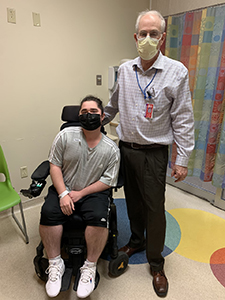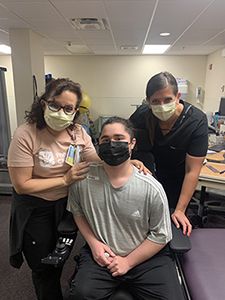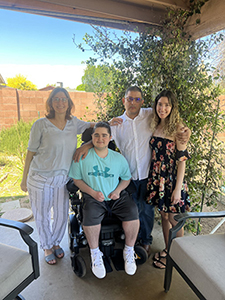Patient and Family Advisory Councils Promote Positive Change

As the parent of a child with Duchenne muscular dystrophy (DMD), Nancy knows firsthand the difficulty of navigating the healthcare system and advocating for someone with complex medical needs. And for many families like her own, the language barrier sometimes complicates the process: Nancy is originally from Cuba, and her first language is Spanish.
Now a member of one of Phoenix Children’s Patient and Family Advisory Councils (PFAC), Nancy walks the journey with other Spanish-speaking families. She guides them through Phoenix Children’s system and points them to important resources. And sometimes she just offers a listening ear.
“When my son was diagnosed, I felt lost,” says Nancy, who serves on the Neuroscience PFAC. “When English is not your first language, you can miss important information about your child’s medical needs and treatments. The team at Phoenix Children’s helped my family get on the right path for this condition, and I feel really grateful. I want to help other Spanish-speaking families, and that motivated me to join the PFAC.”
Danny’s Journey at Phoenix Children’s

Nancy and her husband moved to the United States with their daughter, then 2 years old, in 2002. Their son, Daniel, was born three years later.
Daniel seemed a bit clumsy and fell easily as a toddler, but otherwise his development seemed normal. He was diagnosed with DMD as a 5-year-old, based on a clinical exam, warning signs and symptoms.
The family first came to Phoenix Children’s in 2011, when the newly established Neuromuscular Clinic became a designated Muscular Dystrophy Clinic site. The clinic’s medical director, Saunder M. Bernes, MD, confirmed the DMD diagnosis through DNA testing.
Now 16, Daniel sees providers in multiple specialties at Phoenix Children’s, including neurology, cardiology, orthopedics, pulmonology, ophthalmology, endocrinology and gastroenterology. He also works with physical therapists. A caseworker helps the family connect with resources such as Parent Project MD (PPMD) and CureDuchenne.
“We have excellent doctors and nurses who are experts on my son’s condition,” Nancy says. “They know the best treatments and make sure we know all the different doctors to follow up with. And because this disease is progressive, they are helping us prepare ahead for Danny’s future needs. It’s a wonderful thing.”
Seeking Constant Improvement

A diverse group of patients, parents, family members and caregivers, the PFAC teams up with the Phoenix Children’s staff, leadership and care team to voice patient and family questions and concerns. The goal is to engage patients and families in decision-making on matters that affect quality of care, safety and the overall patient experience.
Phoenix Children’s is committed to constantly improving patient care and giving every child and family the best healthcare experience possible. The PFAC is vital in these efforts. It also helps Phoenix Children’s sustain its family-centered approach to care. The PFACs goals include:
- Promoting patient- and family-centered care at Phoenix Children’s through various opportunities
- Participating in engagement initiatives and regularly scheduled meetings (once a month)
- Sharing positive and negative experiences constructively and objectively
- Providing feedback on ways to improve the experience at the hospital, clinic or any area of care within the Phoenix Children’s network
- Partnering with Phoenix Children’s care teams, staff and leadership to improve the quality and safety of care
- Valuing and respecting diversity
- Maintaining patient and family confidentiality
There are currently eight PFAC teams focused on: Alumni families, Ambulatory/Inpatient, Center for Cancer and Blood Disorders (CCBD), Children’s Advisory Board (patients and siblings, ages 12-18), Gender Proud, Heart Center, Neonatology – Newborn Intensive Care Unit, and Neuroscience. Each PFAC meets monthly.
PFAC Makes a Difference for Patients and Families
Caring for a child with a complex neurological condition can be overwhelming. Phoenix Children’s Neuro PFAC – to which Nancy belongs – worked with care teams and leadership to develop a user-friendly email reminder system for families to schedule future appointments. They also worked with the Barrow Neurological Institute (BNI) to create the BNI Card. Families can present their card at the Emergency Department or an inpatient unit to trigger a specialist consult.
A Voice for Families
For Nancy, the opportunity to connect with other families at Phoenix Children’s and to help make a difference in patient care has been a meaningful investment of her time. She has been impressed at how responsive the care team has been to parent concerns and ideas.
“When you have a child with a rare condition like Duchenne’s, sometimes you feel alone,” Nancy says. “But when you meet other families that have these rare conditions, and you see how it is affecting their lives, you realize that others are also going through hard times. I’m glad to be serving on the advisory council. It's really amazing how the team at Phoenix Children’s listens to the parents, and they consider our suggestions about how to serve families better.”
Interested in serving on a Patient and Family Advisory Council? Click here.
